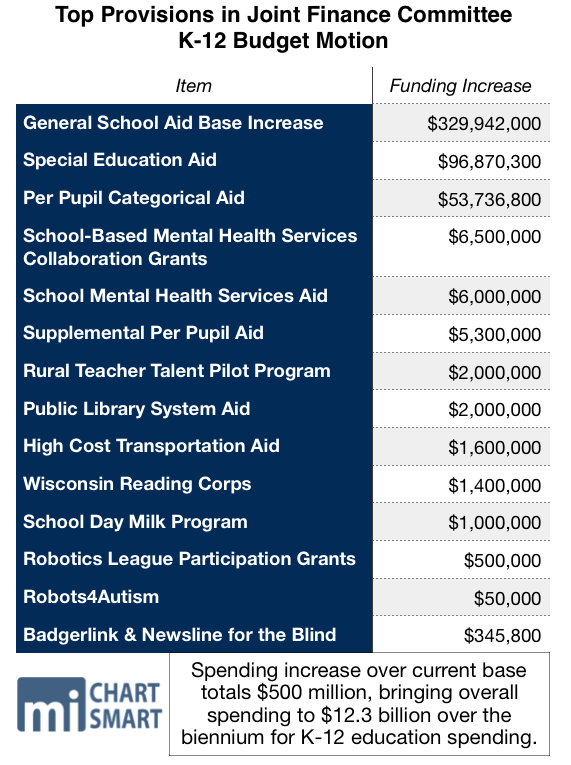 [bctt tweet=”The Joint Finance K-12 motion maintains #SchoolChoice programs and adds millions more in per pupil funding, revenue limit adjustments, and a host of other increases. #wiright #wibudget #wipolitics ” username=”MacIverWisc”]
[bctt tweet=”The Joint Finance K-12 motion maintains #SchoolChoice programs and adds millions more in per pupil funding, revenue limit adjustments, and a host of other increases. #wiright #wibudget #wipolitics ” username=”MacIverWisc”]
May 23, 2019
By Ola Lisowski
The Republican-controlled Joint Finance Committee (JFC) passed its K-12 education budget Thursday, spending $500 million more than current levels. The 2019-21 Department of Public Instruction (DPI) budget will spend $12.3 billion on school aids, a 4.3 percent increase from the base. The previous budget, Gov. Scott Walker’s last while in office, spent $11.8 billion. The 11-4 vote came after two and a half hours of debate.
JFC Democrats asserted that the GOP plan was a spending cut compared with Gov. Tony Evers’ $1.4 billion proposed increase. The final JFC motion that passed on Thursday is a spending hike of $500 million above current levels, a nearly 4.5 percent increase.
The generous Republican plan is possible without the $1.3 billion in tax hikes proposed by Evers’ original budget thanks to years of fiscal discipline and higher-than-expected revenue forecasts that have come as a result. JFC previously stripped $1 billion in tax hikes from Evers’ budget.
Throughout the debate, Democrats continually referred to the spending hike as a cut, with Rep. Chris Taylor (D-Madison) calling it more “cut, gut, boom, bust budgeting.”
When unveiling their plan on Wednesday, Assembly Republicans said they didn’t want to raise taxes to increase spending in the classroom. The previous budget, for 2017-19, added more than $630 million to prior levels of funding. That spending increase was achieved while maintaining a property tax freeze and without raising other taxes.
“This budget shows that, clearly, we can live within our means and build on last session’s historic investments,” Speaker Robin Vos (R-Rochester) said Wednesday. He emphasized that in this economy, Republicans will not agree to raise the income tax, sales tax, or expand welfare.
Of the $500 million increase, approximately $330 million will go to generalized aid for schools. That funding will flow through the equalization aid formula, which benefits property-poor districts in the state, like Milwaukee Public Schools (MPS). Former Republican Gov. Scott Walker favored per-pupil funding in the form of categorical aid that was distributed equally among all school districts.

Evers’ original budget proposal included $611 million in general aid increases. Another major facet of his proposal was a $606 million increase for special education. That would have increased to 60 percent the school district reimbursement for providing those high-cost services.
Instead, the Republican-led JFC approved $97 million in special education increases. In the first year of the budget, districts will have a 26 percent reimbursement rate for those services. That figure will increase to 30 percent in the second year.
In a press conference before the vote, JFC Co-Chair, Rep. John Nygren (R-Marinette), said that the spending level was “more realistic” and that in case of an economic downturn in the future, school districts wouldn’t see drops in funding levels.
Democrats slammed the budget motion, especially the changes to special education aids put forth by Republicans. Sen. Jon Erpenbach (D-Middleton) called the changes “baloney” and derided Republicans for cutting funding from the governor’s proposal. But Republicans pointed back to levels requested by Evers before he began running for governor.
“When Gov. Evers was (Department of Public Instruction) Superintendent Evers, he proposed 30 percent reimbursement,” said Sen. Luther Olsen (R-Ripon). “We will get to 30 percent reimbursement today.”
Olsen, chair of the Senate Education Committee, went on to say that the 30 percent figure is the highest that Evers had ever proposed during his time as state superintendent. In his 2017-19 agency budget request for the Department of Public Instruction (DPI), as superintendent Evers asked for $87 million total for special education aids.
[bctt tweet=”#wibudget: ‘This motion invests more in a lot of areas – a half billion dollars more…Why that’s a ‘cut’ only makes sense in the bubble of government,’ said Rep. Mark Born @repborn. #wiright #wipolitics” username=”MacIverWisc”]
The final budget signed by Walker did not include an increase for special education aids. At the time, Evers called it a “pro-kid” budget.
Two years later, when preparing for his gubernatorial run, Evers brought his request for special education aids up to the $600 million-plus figure his fellow Democrats praised. That shift led GOP leaders to call the proposal “political” and “not realistic.”
Rep. Mark Born (R-Beaver Dam) pushed back on the idea that the massive spending increases are actually “cuts” as Democrats claimed.
“This motion invests more in a lot of areas – a half billion dollars more,” Born said. “Why that’s a ‘cut’ only makes sense in the bubble of government. That doesn’t make sense to my constituents.”
Republicans also slammed the contention that education had been underfunded during the Walker years. Nygren reminded JFC members that the only time Walker cut funding to education was in his first year, facing a $3.6 billion state budget shortfall.
The current budget, for 2017-19, added more than $630 million to the previous levels of funding.
While rarely mentioned during the debate, the JFC omnibus motion also included numerous provisions proposed by Evers. One of those is an increase to the low revenue adjustment, which Assembly Republicans had previously pushed for. That change will allow certain districts to raise property taxes to fund schools.
The low revenue adjustment will increase to $9,700 per pupil in the first year, and $10,000 per pupil in the second year.
Another provision the GOP motion picked up from Evers’ budget was an increase to per pupil funding across the board. Schools will receive $200 more per pupil in the first year, and $204 more in the second year. Three-fourths of the increase will be paid through a revenue limit adjustment, and the rest will come through per-pupil categorical aid.
The motion doubles the amount of money spent on two different types of mental health grants, bringing those line items to $12.5 million more. It spends $2 million on a rural teacher talent pilot program, and adds $1.6 million more to high cost transportation grants.
JFC will be back in on Tuesday, May 28, to vote on agency budgets for the University of Wisconsin System and Department of Natural Resources, among others.